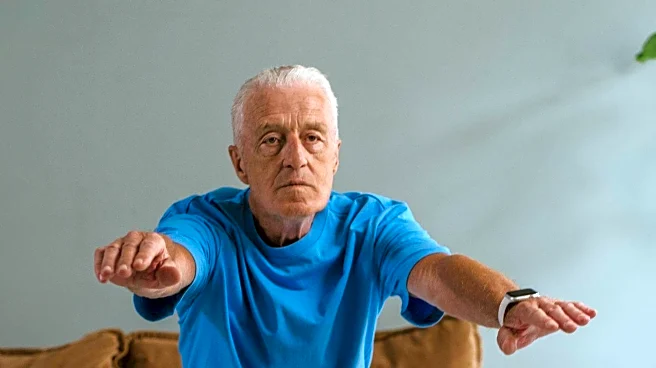What is the story about?
What's Happening?
Recent research led by Takuji Kawamura from Tohoku University has explored the impact of exercise on epigenetic aging, suggesting that structured exercise routines may slow or even reverse the body's molecular aging process. The study, published in Aging, reviews evidence from both human and animal studies, indicating that regular physical activity can influence DNA markers of aging. Epigenetic aging, measured by DNA methylation patterns, provides a more accurate picture of cellular function than chronological age. The research highlights that planned, repetitive exercise routines, such as aerobic and strength training, have stronger anti-aging effects compared to casual activities. Findings show that structured endurance and resistance training can reduce age-related molecular changes in muscle tissue, and multi-week exercise interventions can lower biological age markers in humans.
Why It's Important?
The implications of this research are significant for public health and aging populations. By demonstrating that exercise can potentially reverse epigenetic aging, the study suggests a promising approach to extending healthspan and improving long-term health. This could lead to a shift in public health strategies, emphasizing structured exercise programs to combat aging-related diseases and improve quality of life. Industries related to fitness and healthcare may see increased demand for personalized exercise programs designed to maximize anti-aging benefits. Additionally, the findings could influence policy decisions regarding healthcare funding and support for physical fitness initiatives, aiming to reduce healthcare costs associated with aging populations.
What's Next?
Further research is needed to understand individual responses to exercise and how different types of training affect aging in various organs. The study calls for the development of personalized exercise programs to optimize anti-aging benefits. Researchers may focus on identifying genetic or lifestyle factors that influence the effectiveness of exercise as a geroprotector. This could lead to advancements in personalized medicine and tailored fitness regimens. Stakeholders such as healthcare providers, fitness trainers, and policymakers may collaborate to implement these findings into practical health solutions, potentially transforming approaches to aging and wellness.
Beyond the Headlines
The study opens discussions on the ethical and societal implications of using exercise as a tool to manipulate biological aging. It raises questions about accessibility to structured exercise programs and the potential disparities in health outcomes based on socioeconomic status. As the understanding of epigenetic aging evolves, there may be debates on the role of lifestyle interventions versus medical treatments in managing aging. The research also highlights the need for a cultural shift towards valuing physical fitness as a critical component of healthy aging, potentially influencing educational and community programs.
















